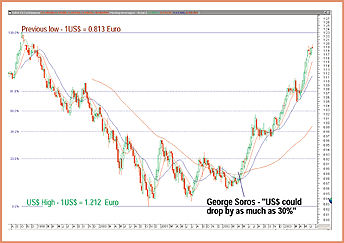FOREX TRADING
An Insider's Perspective
Trading In The Forex Trenches
by Matt Blackman
Foreign exchange markets offer great liquidity, are less prone to being pushed around by major market players, and adhere to technical trading rules more closely than equity markets. So why aren't they more popular with traders? A seasoned forex trader provides us with a view from the inside, including some of his favorite trading strategies.
Experienced traders often remark that the foreign exchange markets are a technician's delight, as they adhere more closely to the technical indicators than other securities. There is less random noise (that is, volatility) in the forex markets, and trends there are generally of the long-term nature.
When currency guru George Soros was asked about the weakness in the US dollar in June 2002, he predicted that the greenback could drop as much as 30% before the move was over, since trends tend to be prolonged. The currency had dropped from 1.14 euros to the dollar in December 2001 to 1.08 by June 2002. A year later, the value of the dollar had fallen to 0.83 euros, a drop of more than 28%, and there were no indications that the move was over. In total, the dollar had dropped (and the euro gained) more than 40% from its high (a euro low) in October 2000, when $1 = 1.21 euros. Since then, the US dollar has experienced a retracement of nearly 100% of its earlier move from late 1998 (see Figure 1).

FIGURE 1: EURO/US$. Euro-FX weekly chart (Euro/US$) from launch to June 2003 with five-, 10-, 20-, and 80-week moving averages. It is interesting to note that the euro paused near each of the significant Fibonacci resistance levels on the way down and on the way back up again.
Soros has played the game long enough to know currency technicals and was clearly expecting the retracement. Traders who listened to him in 2002 have profited handsomely. (Soros said that he was again "short the dollar" after comments made by US Treasury Secretary John Snow on May 19, 2003. In response, the greenback lost more than 2% by month's end.)
According to forex trader Michael Kouznetsoff, trading currencies is not rocket science. Currencies tend to follow fairly strict rules, and are therefore more predictable than other markets. In a recent presentation to the Canadian Society of Technical Analysts in Vancouver, British Columbia, he touted the merits of currency trading, not the least of which are the slow deliberate trends.
Kouznetsoff has traded for 12 years and has been a full-time forex trader for the last eight. He moved from Russia to Vancouver in 1998. I asked him about his trading style, parameters, favorite currency pairs, and technical indicators because I wanted to find out what it was like to trade as a forex professional.
...Continued in the December 2003 issue of Technical Analysis of STOCKS & COMMODITIES
Excerpted from an article originally published in the December 2003 issue of Technical Analysis of STOCKS & COMMODITIES magazine. All rights reserved. © Copyright 2003, Technical Analysis, Inc.
Return to December 2003 Contents